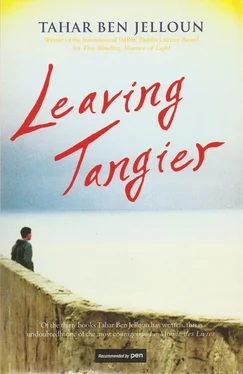Tahar Ben Jelloun - Leaving Tangier
Здесь есть возможность читать онлайн «Tahar Ben Jelloun - Leaving Tangier» весь текст электронной книги совершенно бесплатно (целиком полную версию без сокращений). В некоторых случаях можно слушать аудио, скачать через торрент в формате fb2 и присутствует краткое содержание. Год выпуска: 2009, Издательство: Arcadia Books, Жанр: Современная проза, на английском языке. Описание произведения, (предисловие) а так же отзывы посетителей доступны на портале библиотеки ЛибКат.
- Название:Leaving Tangier
- Автор:
- Издательство:Arcadia Books
- Жанр:
- Год:2009
- ISBN:нет данных
- Рейтинг книги:5 / 5. Голосов: 1
-
Избранное:Добавить в избранное
- Отзывы:
-
Ваша оценка:
- 100
- 1
- 2
- 3
- 4
- 5
Leaving Tangier: краткое содержание, описание и аннотация
Предлагаем к чтению аннотацию, описание, краткое содержание или предисловие (зависит от того, что написал сам автор книги «Leaving Tangier»). Если вы не нашли необходимую информацию о книге — напишите в комментариях, мы постараемся отыскать её.
Leaving Tangier — читать онлайн бесплатно полную книгу (весь текст) целиком
Ниже представлен текст книги, разбитый по страницам. Система сохранения места последней прочитанной страницы, позволяет с удобством читать онлайн бесплатно книгу «Leaving Tangier», без необходимости каждый раз заново искать на чём Вы остановились. Поставьте закладку, и сможете в любой момент перейти на страницу, на которой закончили чтение.
Интервал:
Закладка:
Dead on his feet, Azel was still dazzled by his new environment. He marvelled at the number of paintings on the wall. Waiting in the living room, he hardly dared light a cigarette. Everything was so neat. Not a speck of dust. Silver bibelots, a small army of rare and precious objects, gleamed in a display cabinet.
Carmen brought Azel some coffee. His mind was reeling. Exactly what was expected of him? His first thoughts were of his mother, and of Kenza, too. They would be proud of him some day. Perhaps he might even be able to send Kenza some money and bring her to Spain. Right now, though, he had to face the present. Miguel. And the difficult moments that would inevitably arrive, sooner or later… Miguel was not doing all this through pure altruism. And yet he was a sensitive, intelligent man: surely he must have divined how much Azel loved women…
Miguel hurried into the living room, as dapper as ever, but rather distant, quite soberly dressed, and wearing a black fedora.
‘Did you have a good trip?’ Without waiting for a reply, he added briskly, ‘We must see about your papers right away. We’ll go tomorrow to the police station with your passport to fill out a ton of paperwork. Then we’ll see my lawyer to draw up the final contract for your employment here. For the moment, you’ll stay in the maid’s room on the top floor. It’s very irritating, but we absolutely must go through all this strictly by the book.’
Azel hesitated a moment before asking him exactly what his job would be.
‘Oh come on, don’t play the idiot, you’ve understood perfectly well…’
‘No, Monsieur Miguel, I assure you…’
‘Enough of this pretence! Let’s deal with these documents now; we’ll see about the rest later.’
That evening Azel sat alone in his little room. He wanted to go out but was afraid of Miguel’s reaction. Tired and sad, he went to bed without managing to fall asleep. His head was in a whirl with images that were sometimes clear, sometimes shadowy and confused. Feeling lost, he opened the bag his mother had packed for him and stuffed himself like a kid on honey cakes, reflecting that the paradise he’d dreamed of couldn’t possibly resemble a little attic room in a big villa, or this loneliness that was keeping him awake. He thought of Siham. He remembered her tears, and her body entwined with his. He wanted her. But Siham was now far away. Closing his eyes, he touched himself. Then he opened his notebook and continued writing his letter to his country.
Dear country,
Here I am, far from you, and already I miss something of you; in my loneliness, I think of you, of those I’ve left behind, my mother most of all. What is she doing as I write this? She must certainly be cooking dinner. And Kenza? She’ll be home soon, unless this is the evening she works as a private nurse. My pals, I can just see them, they’re at the café. Rachid is back, saying nothing; the others are playing cards, envying me, thinking how lucky I am. I hear them; they’re speaking of me with resentment. That’s crazy — I’d like to be with them, simply for one hour, and then return here. Well, no: I don’t want to leave even for an hour. I want to stop thinking of you, of your air, your light. You know, from Morocco you can see Spain, but it doesn’t work like that in the opposite direction. The Spanish don’t see us, they don’t give a damn, they’ve no use for our country. I’m in my little room, it smells musty in here; there’s only one window and I don’t dare open it. I admit that I’m disappointed — it’s just that I’m impatient, exhausted, wiped out by the change of climate, and by fear, too, the fear of what’s new, of not being able to cope… I’ll try to fall asleep thinking of you, my dear country, dearest and greatest of my anxieties.
9 . Siham
WHILE AZEL was settling in at the house in Barcelona, Siham was waiting in front of the Spanish consulate to submit a request for a visa. Her file was complete. El Haj had found her a Saudi family living in Marbella that needed a practical nurse to take care of a handicapped woman. Following his instructions, she had sent them her CV and a well-written letter expressing interest in the position. El Haj had insisted that she include her ID photo, which at first made her suspect a trap, but she quickly received an answer from the invalid explaining the reasons for such a request. She preferred dealing with a Muslim woman rather than a Christian one. Siham thought about wearing a veil for the photo, which El Haj had recommended she do, but in the end she decided that was stupid. She didn’t like Islamists and hypocrites. Appropriate clothing and irreproachable behaviour: that’s what really counted for her. El Haj, who liked her, pressed his case.
‘You know, my dear Siham, the veil is sometimes a good thing. Men are less likely to bother girls who wear veils in public, and anyway, there’s no good reason not to wear one! You remember Bouchra, lovely Bouchra who married a businessman much older than she was, but very rich? She used to come to my place completely veiled, I even called her the Masked Marvel! Well, when she took off her ddjellaba and her veil, she was another woman: she wore see-through blouses, tight trousers… She was superb. She wound up winning the jackpot, by the way; how long it will last I can’t say, but she had the look of someone who knew how to handle herself. To top it all off, you know — I can say this to you — she was a virgin! She carefully kept her virginity for her husband.’
‘Is she happy? In any case, she can’t be worried about money.’
‘Don’t fool yourself, the man turned out to be a miser. She phoned me the other day, crying. She lives in a big house surrounded by maids but she’s not allowed to go out. So, this veil: you’re wearing it or tossing it?’
‘Tossing it! You see, my grandmother, who came from the countryside, wore the haik, it’s a kind of Arab cloak. It looked like a voluminous shroud, a huge piece of white cloth she wrapped around herself. No one criticized the wearing of the haik at the time, it was normal. My mother wore the djellaba without the veil, and no one ever asked us to veil ourselves, although my uncle, the one who’d emigrated to Belgium, did complain. Whenever he came visiting on vacation, in the summer, he lectured us about morality. That used to make me giggle, because his daughters smoked in secret, had boyfriends, and so on. They obeyed their father only so he’d leave them in peace to do what they wanted. I hate such hypocrisy. Keeping up appearances and being sleazy on the sly, that’s the Morocco that drives me crazy.’
‘Don’t go crazy, my dear, you’ll see: even if you leave, you’ll always miss your country. We become so attached to Morocco that we can’t forget it completely, it really sticks to us, like an unseasoned frying pan, and we can’t forget it. I travelled quite a bit in my youth, thanks to easy money and parents who never asked questions; I went far away and wherever I was, strangely enough, I missed Morocco…’
‘And how do you explain the fact that those who govern us do nothing for us?’
Siham was surrounded by young people who thought only of fleeing, leaving, working anywhere at all. Too poor to complete her studies in the humanities, she had finally found a job as a legal secretary.
Siham obtained a tourist’s visa good for four months. On the day she left, her parents blessed her. Her parents’ blessing was vital, but not enough, and Siham felt the need for even more protection. She made her ablutions, borrowed her mother’s prayer rug, and prayed to God. She was setting out into the unknown and would be on her guard, especially against all those Arabs living in Marbella. She’d heard stories about white slavery and the mistreatment of women there.
Читать дальшеИнтервал:
Закладка:
Похожие книги на «Leaving Tangier»
Представляем Вашему вниманию похожие книги на «Leaving Tangier» списком для выбора. Мы отобрали схожую по названию и смыслу литературу в надежде предоставить читателям больше вариантов отыскать новые, интересные, ещё непрочитанные произведения.
Обсуждение, отзывы о книге «Leaving Tangier» и просто собственные мнения читателей. Оставьте ваши комментарии, напишите, что Вы думаете о произведении, его смысле или главных героях. Укажите что конкретно понравилось, а что нет, и почему Вы так считаете.












